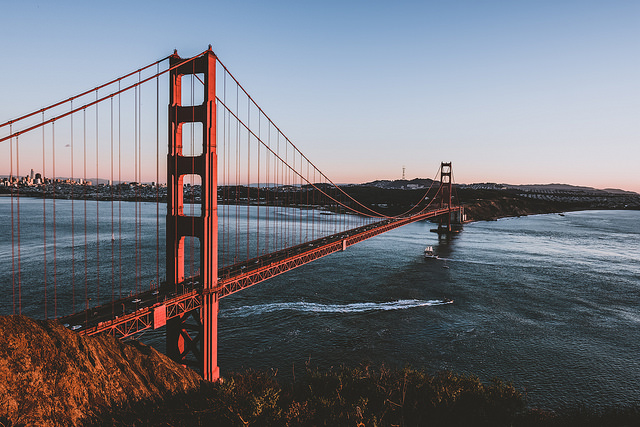
The city attorney claimed Hertz misled its customers about how to avoid PlatePass and its expensive fees by using the free and convenient payment options offered by the Golden Gate Bridge.
Photo via soomness/Flickr.
San Francisco City Attorney Dennis Herrera announced that the Hertz Corporation has agreed to pay $3.65 million to settle a lawsuit brought against the companies for charging, what they claimed, were steep, hidden fees to rental car customers who crossed the Golden Gate Bridge.
The lawsuit also compelled Hertz and its business partner, American Traffic Solutions, Inc., to halt their nationwide practice of charging toll service fees for every day of a car rental, even days the service wasn’t used. Hertz now charges the fee only on days the service is actually used, not the entirety of the rental period. That change alone has already saved customers millions of dollars since it took effect nationwide just over a year ago.
The settlement requires, among other things, that Hertz and American Traffic Solutions:
- pay $3.65 million to the city. The money will be used for future consumer protection enforcement;
- provide customers at Bay Area locations with a Hertz rental record that includes the terms of the Golden Gate Bridge District’s one-time payment option;
- give customers at Hertz Bay Area airport and other high-volume locations a copy of the brochure titled “Crossing the Golden Gate Bridge in a Rented Vehicle,” which explains the options for avoiding rental car toll service fees by paying the toll by phone, online or in person;
- include on the Hertz.com and PlatePass.com websites the material terms of the Golden Gate Bridge District’s one-time payment option;
- train Hertz employees who assist customers at rental counters and exit gates at Bay Area locations about the requirement to distribute the brochure and about the Golden Gate Bridge District’s one-time payment option; and
- refrain from imposing unlawful or unconscionable fees for the PlatePass toll service.
Case Background
The lawsuit Herrera filed on March 1, 2017 stems from Hertz’s PlatePass service, which permits customers to bypass cash toll lanes and use the faster electronic FasTrak lanes without having to establish a FasTrak account. But the Golden Gate Bridge went to cashless, electronic tolling in 2013.
Since then, Hertz’s PlatePass service provides no real benefit to motorists who cross the Golden Gate Bridge. They no longer receive the advertised benefit of faster passage because every lane is the same and available to everyone, with or without PlatePass or FasTrak. And Hertz customers can no longer avoid the service and its fees by paying their tolls via an optional cash lane. The city attorney claimed Hertz misled its customers about how to avoid PlatePass and its expensive fees by using the free and convenient payment options offered by the Golden Gate Bridge.
The result of these practices was that Hertz customers were unwittingly purchasing the supposedly-optional toll service PlatePass, and paying up to $24.75 in extra fees, including fees charged for every day of the car rental, even if the toll service was only used on one of those days. For many customers, that meant paying more than $30 to cross the bridge one time.
The lawsuit alleged that Hertz and American Traffic Solutions, also known as ATS, engaged in false advertising and unfair, unlawful and fraudulent business practices in violation of several state and federal consumer protection laws, including California’s 1988 legislation that specifically prohibits abusive practices in the rental car industry.
American Traffic Solutions has since rebranded itself as Verra Mobility.
San Francisco’s Golden Gate Bridge, one of the “Seven Wonders of the Modern World,” is one of the top-10 tourist destinations in the United States. It was, and remains, the only roadway between San Francisco and California’s northern counties.
Forty million vehicles cross the bridge every year.
